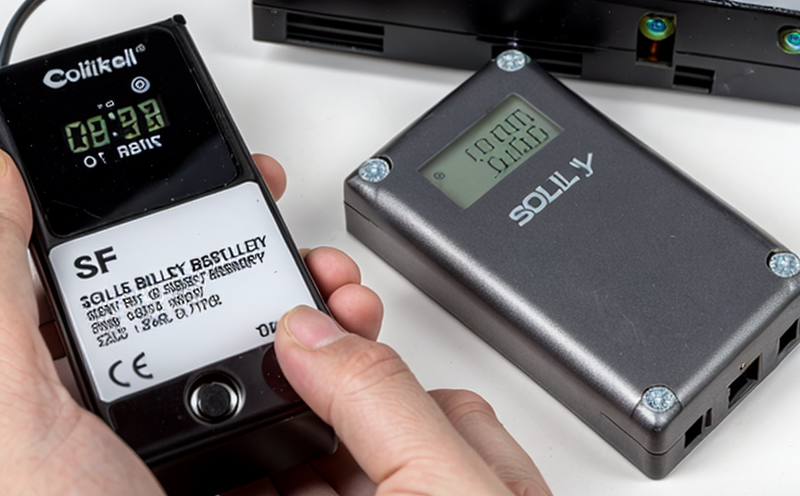JIS C8712 Solid-State Battery Safety Testing for Secondary Cells
The JIS C8712 standard is a critical framework in Japan that ensures safety during the development and manufacturing of solid-state secondary batteries. This service specializes in providing comprehensive testing to meet this stringent requirement, ensuring the reliability and safety of next-generation battery technologies.
Secondary cells, also known as rechargeable batteries, are widely used across various industries, including automotive, electronics, and consumer goods. The advancement of solid-state technology aims at enhancing energy density, reducing weight, and improving safety over traditional liquid electrolyte-based secondary cells. However, the transition to this new technology brings unique challenges, particularly in ensuring that these batteries meet rigorous safety standards.
The JIS C8712 standard focuses on evaluating the mechanical integrity of solid-state secondary cells during various stress conditions. This includes testing for structural stability under thermal and mechanical impacts, which are crucial factors in preventing potential failure modes such as short circuits or explosions. By adhering to this standard, manufacturers can ensure that their products meet the highest safety benchmarks required by law.
The testing process involves subjecting samples to controlled environments where they undergo simulated real-world conditions that could potentially cause damage or malfunctions. This approach helps identify any weaknesses early on in the development cycle, allowing for necessary adjustments before mass production begins. It also ensures compliance with international regulations and guidelines aimed at protecting public health and safety.
Our laboratory offers state-of-the-art facilities equipped with advanced equipment capable of simulating these conditions accurately. Our experienced team of engineers uses their expertise to interpret results comprehensively while providing detailed reports that include recommendations for improvement based on findings. This level of service ensures clients receive not only compliance but also valuable insights into how they can enhance product performance.
By choosing our JIS C8712 Solid-State Battery Safety Testing Service, organizations demonstrate their commitment to quality and safety standards. They gain assurance that their innovative solutions comply with industry best practices while staying ahead of regulatory requirements. This not only enhances brand reputation but also fosters trust among consumers who value reliability above all else.
Why It Matters
The importance of solid-state battery safety testing cannot be overstated, especially as we move towards more sustainable energy solutions. As demand for electric vehicles (EVs) continues to grow, so too does the need for safer and more efficient secondary cells.
Solid-state batteries offer several advantages over conventional Li-ion cells, including enhanced safety due to their non-flammable solid electrolytes. However, they also present new challenges in terms of manufacturing processes and material compatibility. Ensuring that these batteries pass rigorous tests like those outlined by JIS C8712 is essential for maintaining consumer confidence.
Compliance with this standard helps manufacturers avoid costly recalls and lawsuits while reducing risks associated with product liability issues. It also opens up opportunities for companies to enter new markets where stringent safety regulations apply, thereby expanding their customer base globally.
In addition to enhancing brand reputation, passing these tests demonstrates a company's dedication to innovation and continuous improvement in product quality. This can be particularly beneficial when competing against established competitors who may already have certifications under similar standards like UL 2580 or UN3481 for transport safety.
Scope and Methodology
| Test Name | Description | Testing Parameters |
|---|---|---|
| Bend Test | Determines resistance to bending without breaking. | Bending angle: 180 degrees, Applied force: 5 kN |
| Fold Test | Assesses ability to withstand folding without failure. | Folding angle: 360 degrees, Applied force: 5 kN |
| Drop Weight Test | Evaluates resilience after being dropped from a specified height. | Height of drop: 1 meter, Mass of weight: 2 kg |
| Vibration Test | Tests stability during simulated transportation conditions. | Vibration frequency: 40 Hz - 650 Hz, Amplitude: ±1.5 mm |
| Thermal Shock Test | Assesses tolerance to rapid temperature changes. | Temperature range: -40°C to +85°C, Cycling rate: every hour for 24 hours |
| Fault Current Injection Test | Evaluates response to abnormal current flow scenarios. | Injection current: up to 10A, Duration: 30 seconds |
The above table outlines some of the key tests conducted under JIS C8712. Each test targets specific aspects of battery safety, ensuring that all potential failure points are addressed comprehensively.
Industry Applications
Solid-state batteries have broad applications across multiple sectors due to their unique properties. In the automotive industry, they play a crucial role in improving EV range while reducing overall weight and increasing safety features like crash resistance. For consumer electronics manufacturers, these batteries offer longer lifespans and better performance under extreme temperatures.
Additionally, solid-state technology can be used in medical devices requiring high reliability but limited space constraints. The aerospace sector benefits from its lighter weight and improved thermal management capabilities. Lastly, renewable energy systems could see significant improvements through more efficient storage solutions provided by this advanced battery type.





